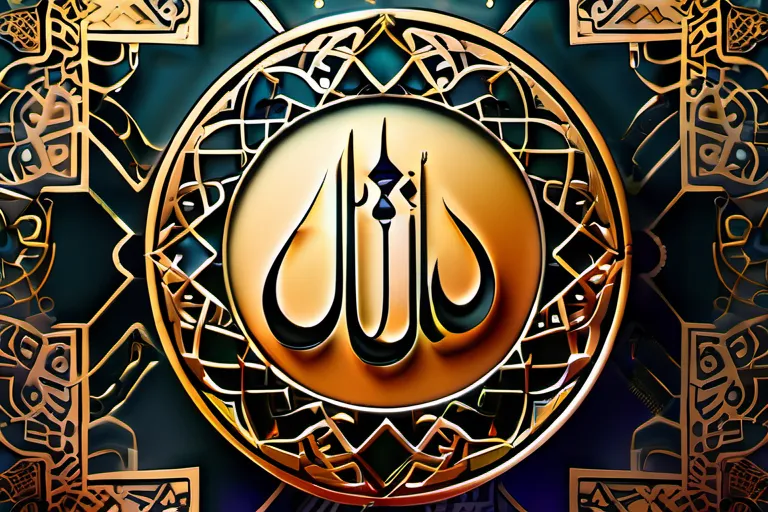Explore the fundamental beliefs, attributes, and unique aspects of Allah in Islam
Delve into the core beliefs that define the Islamic conception of Allah, the one and only God in Islam. Learn about His attributes, how He is perceived, and the role He plays in the lives of Muslims.
The Unity of Allah: Tawhid
Imagine a vast, infinite canvas where every dot and line represents existence itself. In this cosmic artistry lies the concept of Tawhid, the belief in the unity of Allah in Islam. How can something so vast be comprehended by our finite minds? Tawhid is not merely about acknowledging that there is only one God; it’s a profound affirmation of the singularity and indivisibility of Allah’s essence.
Is it not curious how every religion seeks to understand the divine, yet Islam emphasizes this unique idea of Tawhid? By asserting the oneness of Allah, Muslims strive to grasp the incomprehensible. Just as a single thread weaves together the fabric of a tapestry, so too does Tawhid unite all aspects of existence under one God. But what exactly does this mean in practical terms?
One can ask: If Allah is unique and singular, how do we reconcile this with the myriad manifestations of divinity in nature, art, and human hearts? Muslims believe that while creation itself is a reflection of divine attributes, Allah remains incomparably beyond all that has been created. The metaphor of light illuminating a room might help; just as light is present everywhere but does not become the furniture or the walls it illuminates.
Another intriguing aspect of Tawhid is its impact on daily life and ethics. When we understand Allah’s unity, how do we live our lives? Can we truly be just, compassionate, and truthful if we acknowledge that everything we do has a direct connection to this singular Being? The answer lies in the belief that every action, whether good or bad, holds weight before Allah alone.
In essence, Tawhid is not merely a theological concept; it’s a lens through which one views existence itself. It shapes how Muslims understand their purpose and place in the world. As we ponder this profound idea, we are reminded of the vastness of our faith and the infinite depths to explore within it.
Allah’s Attributes: What Muslims Believe About God
Imagine a vast, boundless universe where every star and galaxy obeys a single law. Now, think about that same concept but applied to the human world—a cosmos governed by one supreme authority. In Islam, this authority is known as Allah, and He is believed to possess an array of attributes that define His essence.
One of these attributes is omniscience. Muslims believe Allah knows everything—past, present, and future—without the need for sensory experience or information. It’s as if He has a map of the entire universe etched into His very being. How can you trust someone who doesn’t know your deepest thoughts? For Muslims, knowing that Allah sees all is both comforting and reassuring.
Omnipotence, on the other hand, means He has absolute power over everything. This attribute might seem daunting at first, but consider it this way: when you’re in a storm and your shelter seems like the only safe place, Allah is that shelter. He can change events as easily as you turn off a light switch. The idea of a powerful God who can intervene in human affairs gives Muslims strength during their darkest moments.
Mercy, however, might be the most comforting attribute of all. Muslims believe Allah has immense mercy and kindness towards His creations. Just like how a parent loves their child unconditionally, Allah is seen as infinitely merciful. But this doesn’t mean He’s lax or careless; rather, it suggests that even in His judgment, there is an underlying compassion.
These attributes—omniscience, omnipotence, and mercy, along with others like justice, truth, and life—all paint a picture of a God who is both just and merciful. Muslims find solace in knowing that their actions are being watched over by someone who understands everything and can intervene when needed. This belief shapes not only their theology but also their daily lives, guiding them towards righteousness and goodness.
Reflecting on these attributes makes one ponder: how do you live your life with such a God watching over you? Do you strive for righteousness or succumb to laziness? The choices we make are influenced by the belief in a merciful and powerful Allah who sees everything.
The Role of Allah in Islamic Life
How does one navigate through life when faced with uncertainties and challenges? Muslims believe that finding answers lies in submission to Allah’s will, who is seen as the ultimate guide and protector in their daily lives. But what exactly is this submission, and how deeply does it influence a Muslim’s actions?
Submission to Allah’s will, or Islam, means more than just following rules; it involves living in harmony with His teachings. It’s like navigating through a vast ocean, where the tides can be unpredictable, but you trust your ship’s captain to guide you safely. In this metaphor, Allah is the experienced sailor who knows the safest routes and the best times for sailing.
For Muslims, prayer plays a significant role in staying connected with Allah. It serves as a constant reminder of His presence and power in their lives. Imagine calling out to a lighthouse keeper during a storm; just as sailors seek reassurance from their trusted guides, Muslims turn to Allah through prayers for guidance and comfort.
The act of giving charity (Zakat) is another aspect that reflects submission. It’s not merely about distributing wealth but aligning one’s life with the principles of fairness and compassion taught by Allah. This can be likened to planting seeds in a garden; while the initial effort might seem small, it nourishes the soil of one’s soul, leading to greater abundance over time.
Ultimately, submission to Allah’s will encompasses every moment of a Muslim’s life—how they treat others, how they face challenges, and how they seek solace in difficult times. It’s about living each day with purpose and direction, knowing that every action is part of a broader tapestry woven by the divine.
So, as you move through your days, do you find yourself seeking guidance or reassurance from someone or something? In the heart of every Muslim lies the belief in Allah’s infinite wisdom and compassion. Understanding this core belief opens up a world where each choice can be seen as an act of submission to the will of the Almighty.
Allah’s Relationship with Humans: Mercy and Justice
How does Allah, as depicted in Islam, navigate the intricate balance between mercy and justice in His relationship with humans? Is it like the careful hand of a gardener nurturing young saplings while ensuring they don’t overshadow each other? Or is it more like a wise judge who balances compassion with firmness to maintain order and righteousness?
According to Islamic teachings, Allah’s mercy is boundless. The Quran speaks of numerous verses where Allah promises forgiveness and salvation to those who seek His mercy (e.g., Quran 2:197). This divine attribute, known as Rahman, emphasizes that Allah is the All-Merciful. It’s often likened to a parent’s love for their child—endless and unconditional.
However, Allah’s justice is also paramount. The concept of Adl in Islam ensures that no one is wronged or favored unjustly. In the Hadith, Prophet Muhammad (PBUH) said, ‘The most beloved of deeds to Allah are those done regularly, even if they are small.’ This reflects a balanced approach where consistent righteous actions are valued highly.
The question arises: how do these two attributes coexist in Islam? One can argue that mercy and justice are not mutually exclusive but rather complementary. Just as a parent’s love (mercy) is balanced with discipline (justice), Allah’s attributes of mercy and justice work hand in hand to guide humanity towards righteousness.
Reflecting on this, one might wonder if the intricate web of human lives is not orchestrated under such a benevolent yet just framework. Is it not comforting to know that while we strive for moral excellence, there is an overarching system of divine mercy and justice supporting us?
The Uniqueness of Allah: Distinguishing Islam from Other Monotheistic Traditions
Have you ever wondered what sets Islam apart from other monotheistic traditions? One of the key distinctions lies in the unique attributes and beliefs surrounding Allah. In Islam, Allah is not just a deity; He is described as the one true God who created and sustains all that exists. But how does this differ from other religions?
For instance, while Christianity and Judaism also believe in one God, they have distinct views on angels and prophets. In Islam, angels are seen as created beings who carry out divine commands with utmost reverence. They are messengers of Allah and play a crucial role in the religious narratives, much like Mika’il, Gabriel, and Raphael. However, their roles are often more defined and specific within Islamic teachings.
Moreover, the concept of prophets is central to Islam, yet their number and nature differ from those in other monotheistic traditions. Muslims believe that Allah sent messengers throughout history, starting with Adam and ending with Muhammad, to guide humanity. Each prophet was given a specific message for his time but the core message of monotheism remained constant.
One striking aspect in Islam is the belief that all prophets received similar teachings about one God, yet each community adapted these teachings based on their cultural context. This unity amidst diversity challenges us to question how our beliefs are passed down and interpreted over generations. It also underscores the idea that divine guidance is timeless and universal.
Reflecting on this, we see that the uniqueness of Allah in Islam goes beyond just theology; it encompasses a holistic approach to understanding His attributes and His relationship with humanity. By exploring these unique aspects, we gain deeper insights into why Muslims find their faith both familiar and profoundly different from other traditions.
The Power of Prayer: Communicating with Allah
Imagine walking into a vast, open space where light gently bathes every corner. This place symbolizes the essence of prayer in Islam, known as Salah. Just like how one might seek refuge from the heat under the shade of a tree, Muslims seek solace and guidance through their prayers to Allah, their sole deity.
Prayer is not just about reciting verses; it’s a profound connection between the heart and the divine. It’s like reaching out for a handshake with someone you deeply respect and admire. Through Salat, Muslims express their gratitude, seek forgiveness, and ask for guidance. The act of standing before Allah in humility and reverence is both humbling and empowering.
Each prayer session is structured as if it were a bridge connecting the earthly realm with the divine one. By performing the five daily prayers—Fajr, Dhuhr, Asr, Maghrib, and Isha—Muslims ensure that their spiritual journey is continuous, much like navigating through a river with its gentle yet persistent flow. Each prayer acts as a checkpoint, reminding them of their purpose and the path they are on.
The significance of these prayers extends beyond mere ritual; they serve as a constant reminder to stay connected to Allah throughout the day. It’s like wearing a bracelet that gently reminds you of something precious with each movement. These prayers are a way for Muslims to keep faith alive, making it an integral part of their daily lives.
Moreover, prayer in Islam is not limited to just recitation; it involves both heart and action. The act of performing Salat includes physical movements such as bowing (Ruku) and prostration (Sujood), which symbolize submission and humility before Allah. It’s a multifaceted experience that engages the entire person—mind, body, and spirit.
By delving into the practice of prayer in Islam, one can truly understand its transformative power. Prayer is not just about communication but also about internal transformation. It’s through these acts of devotion that Muslims find strength, seek guidance, and reaffirm their commitment to their faith.
Prayer, therefore, becomes a bridge between the earthly and the divine, fostering a deep connection with Allah in every aspect of one’s life. It’s about finding solace, asking for guidance, and expressing gratitude—each prayer a step towards a deeper understanding of one’s own purpose.
Conclusion
 Gain a deeper understanding of the centrality of Allah in Islamic belief and practice, and appreciate the unique aspects that distinguish the Islamic view of God from other monotheistic traditions.
Gain a deeper understanding of the centrality of Allah in Islamic belief and practice, and appreciate the unique aspects that distinguish the Islamic view of God from other monotheistic traditions.











